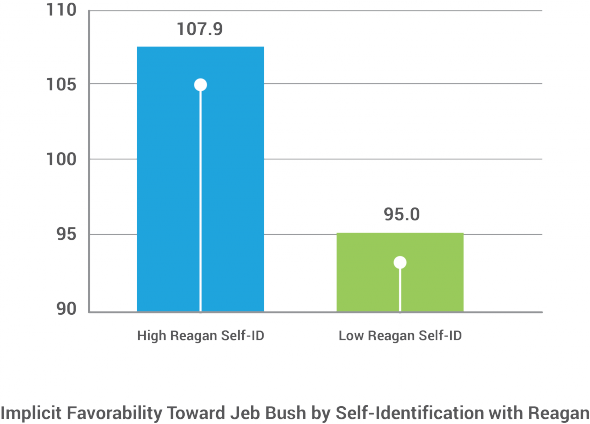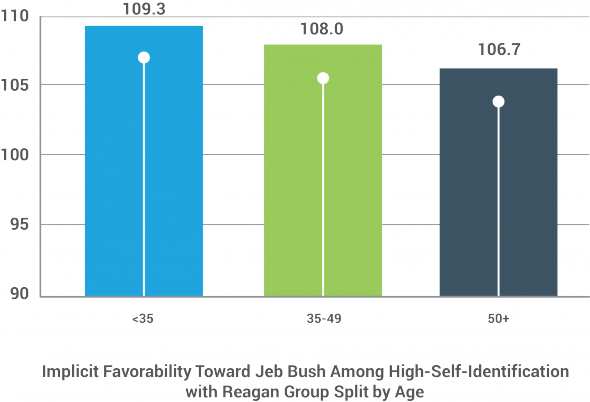Can Jeb Bush Get a Rise in the Polls from Ronald Reagan?
The timing may be fortuitous for the former Florida Governor given emotion surrounding ISIS and the Syrian refugee crisis. But questions remain whether this emotional swell is enough to carry sentiment for the Bush campaign over the long haul.
However, recent research conducted by Sentient Decision Science on perceptions of the Republican candidates suggests that implicit associations with Bush (those thoughts and feelings that automatically come to mind when voters think of Jeb) offer a longer-term foundation on which to build affinity toward his candidacy.
In a recent national implicit research poll of voters, we included the Sentient self-relevance module to assess the degree of personal connection each candidate is making with the voters’ sense of self.
This implicit measure has been shown to be related to long-term loyalty and unique neural processing patterns in the brain. As a twist, we included an assessment of self-identification with one wild card political figure: Ronald Reagan.
Given the number of times Reagan is invoked by candidates as an aspirational figure for the Republican party, we thought it would be interesting to see which candidates shared the greatest implicit connection with Reagan, and if that association influenced favorability toward that candidate.
– thank you to Dr. Cyrus McCandless, Director of Behavioral Science at Sentient, for this design enhancement
The results were favorable for Jeb Bush. Voters who most strongly self-identified with Reagan felt significantly more favorable toward Bush than to Bush’s former protégé Marco Rubio.

It turns out that the result of high self-identification with Reagan is not driven by the generational factor. In fact, we saw similar levels of self-identification with Reagan for millennials as we did with boomers.
This suggests that the personal connection with Reagan’s brand transcends age and is a relevant factor even among millennial voters.

This implicit connection between Jeb and Reagan, one that transcends generational differences, may be potentially underleveraged by the Bush campaign, particularly in the current climate of uncertainty on how the next commander in chief will handle the threat of ISIS.
If Jeb’s latest advertising in the first primary state of New Hampshire is any indication, the campaign is aware of the need to project a tough-on-terror image. Sentient Prime implicit data shows a strong positive association among Republican voters to his “Destroy (vs. Contain) ISIS” messaging.
These data raise an interesting possibility that an implicit link to the strong foreign policy positions of Reagan could reinforce the connection of voters’ sense of self with the Bush candidacy.
As we find in all of our global brand equity and positioning work, it is prudent to test messaging in terms of how well it reinforces the connection with your brand and your target audience’s core sense of self.
In this case, the implicit connection with Reagan represents a set core values that transcends generational differences and forms an enduring foundation for candidates even today.
